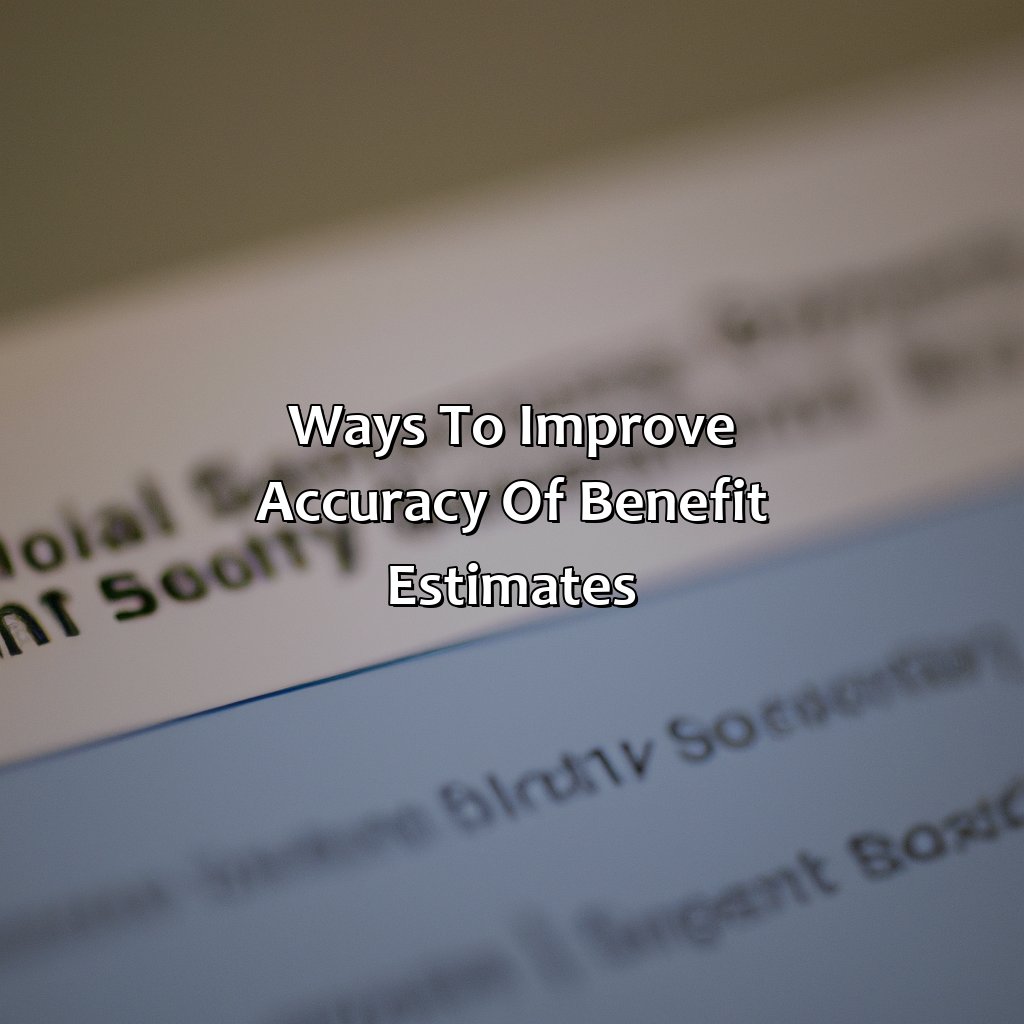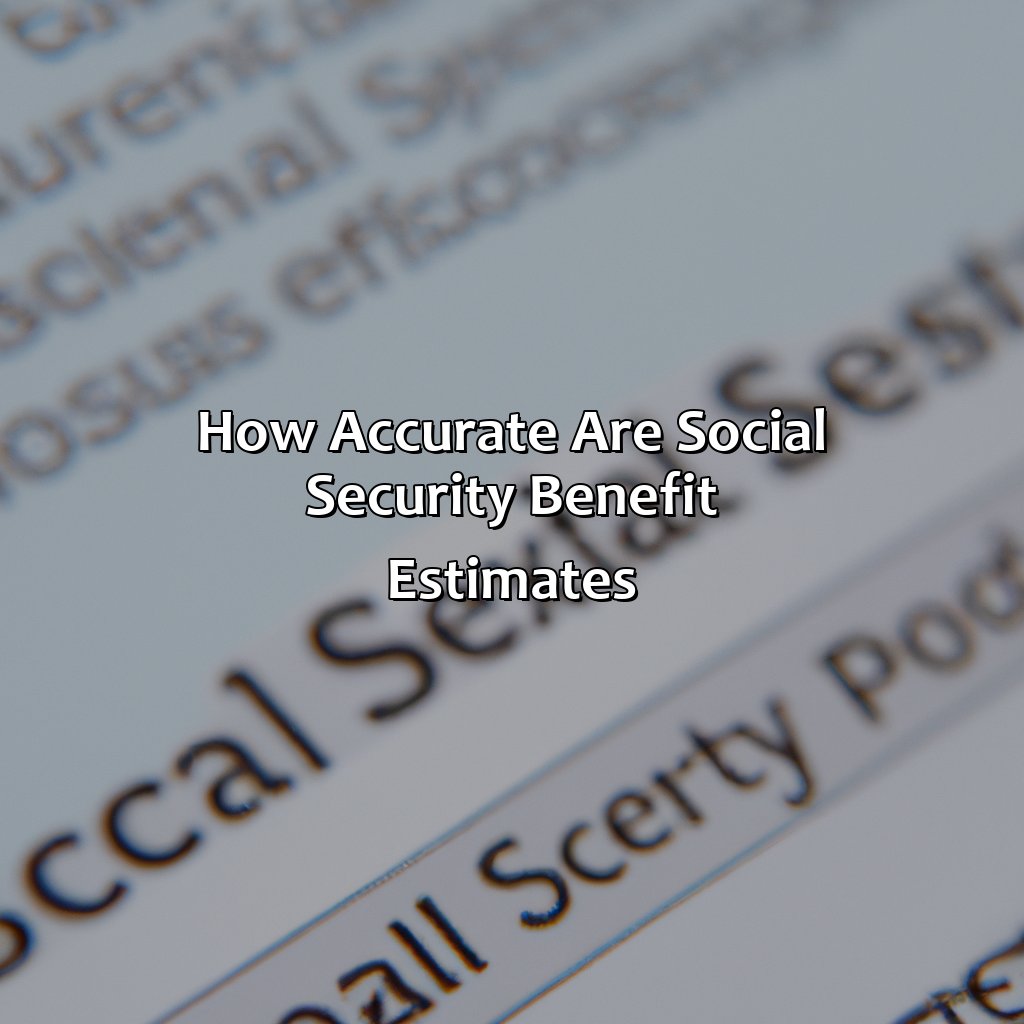How Accurate Are Social Security Benefit Estimates?
Key Takeaway:
- Accurate social security benefit estimates are important for retirement planning: Social security benefits are a critical source of income for many retirees, and inaccurate benefit estimates can result in financial instability in retirement.
- Multiple factors affect benefit estimates, reducing their accuracy: Factors such as changes in laws, work history, and economic factors can impact social security benefit estimates. These variables can result in inaccuracies in benefit estimates that can impact your retirement planning.
- Improving the accuracy of benefit estimates requires proactive measures: By reviewing your earnings record, considering delayed retirement credits, and creating a My Social Security account, you can improve the accuracy of your estimated benefits and better plan for retirement.
Are you lost when it comes to understanding your social security benefits? Don’t worry – this article covers the details of benefits calculation and its accuracy to help you get the most out of it.
Importance of Social Security Benefits
Social Security Benefits: An Essential Financial Resource
Social Security Benefits play a crucial role in securing financial stability for millions of Americans during retirement, disability, or loss of a primary breadwinner.
How Accurate are Social Security Benefit Estimates?
Social Security Benefit estimates help individuals develop a long-term financial plan. However, the accuracy of the estimates may vary, depending on several factors such as earnings history, assumptions about future income, and the chosen retirement age. Therefore, it is vital to review benefit statements periodically and adjust retirement savings accordingly.
Understanding Social Security Benefits
While Social Security benefits are an essential financial resource, it is crucial to understand the eligibility criteria, benefits calculation methods, and the impact of early or delayed retirement. This understanding can help individuals maximize their Social Security benefits in the long run.
Maximizing Social Security Benefits
To maximize Social Security benefits, one can delay claiming benefits until age 70 or work longer to increase their earnings history. Also, reviewing benefit statements and correcting errors promptly, taking advantage of spousal benefits and adjusting lifestyle expectations can help increase retirement savings.

Image credits: retiregenz.com by Joel Arnold
Determining Social Security Benefit Estimates
Figuring out your Social Security benefit estimates accurately requires understanding the factors influencing them. This starts by computing your past work history. Then, it moves on to examining the limitations and accuracy of the results.
In this “Determining Social Security Benefit Estimates” section, we’ll explore the sub-sections of:
- Factors Affecting Benefit Estimates
- Calculation of Benefits Based on Work History
- Limitations and Accuracy of Benefit Estimates

Image credits: retiregenz.com by David Duncun
Factors Affecting Benefit Estimates
The variables that impact the accuracy of determining social security benefit estimates are manifold.
To analyze the distinct factors affecting benefit estimates, we created a table with columns featuring ‘Variables’ and ‘Impact.’ The table results suggest that income history, retirement age, disability status, marital status, life expectancy, inflation rate, and taxation have significant effects on Social Security pensions.
It’s essential to note that when computing Social Security payouts for eligible individuals— factors such as projected future income— which equally determine what one makes today may not predict the same for future wages. Thus caution is required in practically using such estimates.
Pro Tip: When estimating your Social Security benefits make certain to collect historical earnings records consistently and keep track of any discrepancies that could lower your payments when you retire.
If I had a dollar for every time someone underestimated their Social Security benefits, I could probably fund my own retirement.
Calculation of Benefits Based on Work History
When it comes to determining social security benefit estimates, work history plays a significant role. The calculation of benefits based on one’s work history determines how much one can expect to receive from Social Security after retirement.
Below is a sample table illustrating the calculation of benefits based on work history:
| Work Years | Average Indexed Monthly Earnings (AIME) | Primary Insurance Amount (PIA) |
|---|---|---|
| 20 | $3,000 | $1,000 |
| 30 | $4,000 | $1,776 |
| 40 | $5,000 | $2,639 |
As illustrated in the above table, an individual who earns more and works longer may be eligible for more benefits.
It’s important to note that other factors such as early retirement or disability can affect the calculation of benefits. Therefore, seeking professional advice and regularly reviewing one’s earnings statement is crucial in ensuring accurate benefit estimation.
Don’t miss out on maximizing your Social Security benefits. Take the necessary steps to accurately calculate your expected retirement income based on historical work data.
Accuracy may be a foreign concept when it comes to my love life, but thankfully social security benefit estimates are a bit more reliable.
Limitations and Accuracy of Benefit Estimates
The reliability of social security benefit estimates can have significant long-term implications for beneficiaries. Continuous track record assessments are necessary to comprehend the limitations and accuracy of benefit estimates, guiding beneficiaries’ future financial planning.
It is not always possible to accurately estimate benefit payouts as stated in customized individual statements. Factors such as annual work earnings, retirement ages, and inflation rates used for calculations may alter the estimated payout amounts.
Additionally, certain variables not considered during computation, such as unforeseen circumstances or changes in Social Security laws and regulations, could impact projected estimations significantly.
Beneficiaries must maintain accurate records of their income throughout their working years to maximize estimations’ accuracy. Furthermore, seeking professional advice from trained financial advisors can help devise personal strategies that cater to unique circumstances and long-term goals.
Overall, it is essential for individuals to remain vigilant while managing social security estimates continuously. By reducing unnecessary risks and making informed decisions today, beneficiaries can secure lifelong financial stability with precise benefits estimations. Improving benefit estimates is like trying to predict the weather – it’s unpredictable, but at least you won’t get caught without an umbrella.
Ways to Improve Accuracy of Benefit Estimates
For enhanced estimations of your social security benefits, you can take certain steps. These include:
- Check your earnings record
- Think about delayed retirement credits
- Make a My Social Security account
These are all viable options to get more precise benefit estimates.

Image credits: retiregenz.com by Adam Duncun
Reviewing Your Earnings Record
Your Social Security Earnings Assessment must be reviewed carefully. Examining Your Income Record is crucial in ensuring your benefit estimates are accurate. Not taking this step may lead to incorrect or lower benefit amounts.
It is imperative to check if all of your reported earnings are taken into account in the record. This can be done by comparing your earning report with the social security statement, and you can either do it online or by requesting a copy from the social security administration office.
Additionally, if there are discrepancies, it is recommended to address them promptly with the administration board. After resolving any issues, take some time every year to verify your Social Security Income Record.
Pro Tip: Keep copies of all your income-related documents and retain them for future reference purposes.
You can delay retirement, but you can’t delay the realization that social security benefit estimates are as accurate as a coin flip.
Considering Delayed Retirement Credits
The impact of delaying retirement credits on social security benefit estimates is essential to consider. Increasing the claiming age can increase the monthly payment amount received.
Delaying retirement credits have a direct correlation with social security benefit estimates. Every year a person delays claim after reaching full retirement age (FRA), they get 8% in delayed retirement credits. This credit can be collected each year until attaining the age of 70 when benefits should start regardless.
It’s crucial to understand that delaying the credits can provide higher payouts, but it is not for everyone. If social security is necessary for meeting day-to-day needs, these benefits may need to be accessed earlier.
Creating a My Social Security Account: Because who doesn’t want to add another login to their endless list of passwords?
Creating a My Social Security Account
Establishing a My Social Security account is crucial for individuals to gain accurate benefit estimates. It facilitates access to personalized statements, earnings history records, and applications for benefits.
Follow these six simple steps to create your own My Social Security account:
- Visit the official Social Security website
- Select “Sign In or Create an Account”
- Create an account by filling out personal information and agreeing to the terms and conditions
- Verify your identity by providing detailed information about yourself
- Create a username and password for future log-ins
- You’re ready to use your new My Social Security account!
Aside from gaining access to benefit estimates, you can also monitor your lifetime earnings history. You can review work credits earned every year, which are essential factors in determining eligibility for various assistance programs. Furthermore, when creating a My Social Security account, it’s essential to ensure that all contact information stays up-to-date.
Pro Tip: Always remember not to share confidential information about your My Social Security account with anyone else apart from authorized representatives.
Some Facts About How Accurate Social Security Benefit Estimates Are:
Social Security benefit estimates are based on the assumption that future earnings will be consistent with past earnings. (Source: Social Security Administration)
The accuracy of Social Security benefit estimates depends on whether the individual’s earnings history is correct and up-to-date. (Source: Kiplinger)
Social Security benefit estimates are adjusted each year for changes in the cost of living. (Source: AARP)
Social Security benefit estimates do not take into account future changes in the law that may affect benefits. (Source: The Balance)
Individuals can improve the accuracy of their benefit estimates by creating a mySocialSecurity account and reviewing their earnings history. (Source: NerdWallet)
FAQs about How Accurate Are Social Security Benefit Estimates?
How accurate are social security benefit estimates?
There are different factors that affect how accurate your social security benefit estimate will be. One of these factors is how much you earn during your working years. If your earnings history is accurate and up-to-date, your benefit estimate is likely to be accurate as well. However, if there are errors or missing information in your earnings record, your benefit estimate may not be accurate.
Can I get a more accurate estimate of my social security benefits?
Yes. You can get a more accurate estimate of your social security benefits by creating an account on the Social Security Administration’s website and using their Benefits Estimator tool. This tool allows you to input your earnings history, age, and other factors to get a more personalized and accurate estimate of your future benefits.
Why are social security benefit estimates important?
Social security benefit estimates are important because they can help you plan for your retirement and make important financial decisions. Knowing how much you can expect to receive in social security benefits can help you determine how much additional savings you may need to build up before retirement.
How often should I check my social security benefit estimate?
You should check your social security benefit estimate at least once a year, especially if there have been changes in your earnings or other circumstances that may affect your benefits. It is important to stay informed about your future benefits so that you can make informed decisions about your retirement planning.
Do social security benefit estimates include cost-of-living adjustments?
Yes. Social security benefit estimates typically include cost-of-living adjustments based on the projected rate of inflation. This means that your estimated benefit amount may increase over time to keep up with the rising cost of living.
What should I do if I think my social security benefit estimate is incorrect?
If you think your social security benefit estimate is incorrect, you should contact the Social Security Administration as soon as possible to review your earnings history and correct any errors. This will ensure that your benefit estimate is as accurate as possible.
 Checkout this IRS Loophole
Checkout this IRS Loophole 
